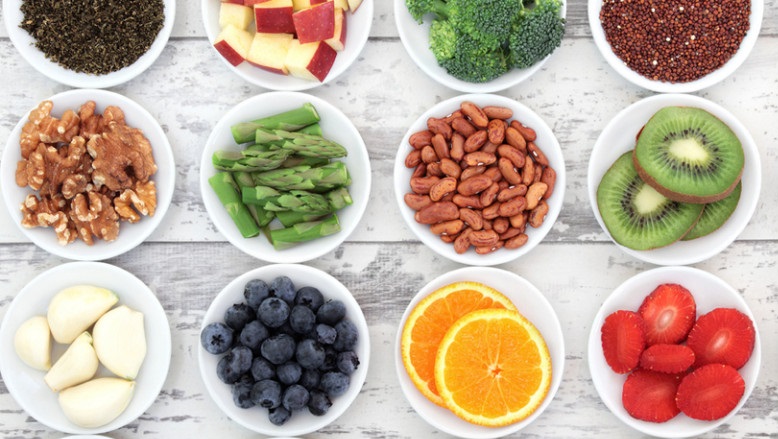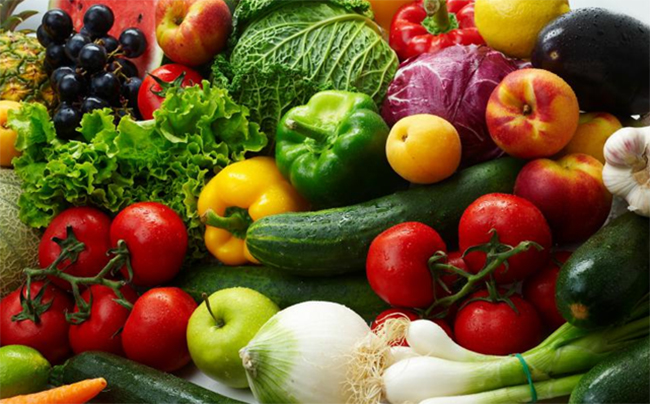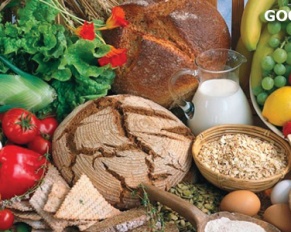While it’s relatively new as an academic subject, lifestyle medicine essentially promotes much of what we already regard as good…


While it’s relatively new as an academic subject, lifestyle medicine essentially promotes much of what we already regard as good…

Kids love to snack. In fact, after they get out of school, it’s often foremost on their minds … grabbing a snack and heading off to a fun after-school activity. But as a parent, it’s a foregone conclusion that you don’t relish your kids snacking nearly as much as they do. All those sugary, unhealthy snacks wreak havoc on their teeth, their bodies, and even their minds. And with all the refined, processed snacks out there these days, it can be hard sometimes to find snacks that are good for them. If you’re a teacher, you watch kids eat unhealthy foods every day for lunch, likely because many parents have a hard time coming up with healthy snacks their children will actually eat rather than toss out or trade for something that tastes better. Here are some healthy snack ideas for kids from top teachers in New Jersey that will keep your children from trading health for taste.
 Hot fun in the summertime! You’re raring to get outdoors and do all those awesome summery activities you’ve got planned, like tanning, swimming, and picnicking into the wee small hours. STOP! You need to know that all that summer fun you’ve been waiting for can come to a screeching halt if you don’t first arm yourself with safety tips for outdoor summer activities. Summer’s about sun, fun, and spending quality—and quantity—time with friends and family. But nothing will stop you in your tracks like a serious sun burn or a nasty case of swimmer’s ear. From how to prevent swimmer’s ear to how to keep sunburn at bay to tweaking your summer diet for optimum health, here are some tips that will help you make the most of the lazy days of summer.
Hot fun in the summertime! You’re raring to get outdoors and do all those awesome summery activities you’ve got planned, like tanning, swimming, and picnicking into the wee small hours. STOP! You need to know that all that summer fun you’ve been waiting for can come to a screeching halt if you don’t first arm yourself with safety tips for outdoor summer activities. Summer’s about sun, fun, and spending quality—and quantity—time with friends and family. But nothing will stop you in your tracks like a serious sun burn or a nasty case of swimmer’s ear. From how to prevent swimmer’s ear to how to keep sunburn at bay to tweaking your summer diet for optimum health, here are some tips that will help you make the most of the lazy days of summer.
 Food is fuel. So perhaps a better term for these foods is super fuel—because that’s what your body receives when you eat them—fuel that supercharges you. Think about this … you wouldn’t put just any old junk into your car’s gas tank, right? Of course not! You put gasoline in your gas tank—because, well, that’s all it will take without harming your car. Yet many of us think nothing about putting junk inside our bodies. But isn’t your body so much more important than your car? Now, think of it this way … eating super foods is like not only putting gasoline into your car’s gas tank rather than junk; it’s like putting premium ultra-supreme super-duper unleaded gasoline into it! And with each super food you eat, your body gets that much stronger and healthier. If you’re searching for daily health tips (and you must be—otherwise you wouldn’t be reading this article!), you’ve come to the right place. Following is important information about super foods—what super foods are, their history, how they got to be called ‘super foods,’ as well as which foods have the power to keep your body functioning properly.
Food is fuel. So perhaps a better term for these foods is super fuel—because that’s what your body receives when you eat them—fuel that supercharges you. Think about this … you wouldn’t put just any old junk into your car’s gas tank, right? Of course not! You put gasoline in your gas tank—because, well, that’s all it will take without harming your car. Yet many of us think nothing about putting junk inside our bodies. But isn’t your body so much more important than your car? Now, think of it this way … eating super foods is like not only putting gasoline into your car’s gas tank rather than junk; it’s like putting premium ultra-supreme super-duper unleaded gasoline into it! And with each super food you eat, your body gets that much stronger and healthier. If you’re searching for daily health tips (and you must be—otherwise you wouldn’t be reading this article!), you’ve come to the right place. Following is important information about super foods—what super foods are, their history, how they got to be called ‘super foods,’ as well as which foods have the power to keep your body functioning properly.

Why organic and why freshly grown? With corporations producing most of our food, these days profit comes before quality. Most fruit and vegetables grown rely heavily on chemical fertilizers and pesticides. Genetically Modified Organisms (GMO) are widely used in crops these days to improve yield and obtain certain qualities in the crops. It is a very hot topic these days with many arguing the negative effects on our health.
 It’s not hard to live a healthier life. In fact, living an unhealthy life is probably harder than making just one or two small changes toward that healthier life. That’s really all it takes—just one or two small steps—and you’re on your way to a healthier, more vibrant life where you’re doing all the things you enjoy. For instance, if you’re eating an unhealthy diet, you likely feel tired, run-down, unable to tackle all those things you need to get done in a day, let alone the things you want to do. But replace just a couple unhealthy foods and add a few steps here and there throughout your week and you’re well on your way to living that healthier life you so desire. If you’ve recently visited a top doctor near you and it was suggested you should get on the road to living a healthier life, here are valuable steps you can take on your journey.
It’s not hard to live a healthier life. In fact, living an unhealthy life is probably harder than making just one or two small changes toward that healthier life. That’s really all it takes—just one or two small steps—and you’re on your way to a healthier, more vibrant life where you’re doing all the things you enjoy. For instance, if you’re eating an unhealthy diet, you likely feel tired, run-down, unable to tackle all those things you need to get done in a day, let alone the things you want to do. But replace just a couple unhealthy foods and add a few steps here and there throughout your week and you’re well on your way to living that healthier life you so desire. If you’ve recently visited a top doctor near you and it was suggested you should get on the road to living a healthier life, here are valuable steps you can take on your journey.
 Of sugar, New York Knicks basketball player Derrick Rose says, “Everyone’s got their poison; mine’s sugar.” Perhaps calling sugar a ‘poison’ is a bit strong, but the truth is that sugar—particularly the processed stuff—is not very good for you. In fact, many healthcare professionals and nutritionists now are actually calling sugar an addictive substance. If you look up the term ‘addictive’ in a thesaurus, similar words are ‘habit-forming,’ ‘obsessive,’ and yes, even ‘enslaving.’ But how addictive is sugar, really? Following are some important daily health tips about the potential addictive qualities of sugar that will help you decide for yourself how much sugar is too much.
Of sugar, New York Knicks basketball player Derrick Rose says, “Everyone’s got their poison; mine’s sugar.” Perhaps calling sugar a ‘poison’ is a bit strong, but the truth is that sugar—particularly the processed stuff—is not very good for you. In fact, many healthcare professionals and nutritionists now are actually calling sugar an addictive substance. If you look up the term ‘addictive’ in a thesaurus, similar words are ‘habit-forming,’ ‘obsessive,’ and yes, even ‘enslaving.’ But how addictive is sugar, really? Following are some important daily health tips about the potential addictive qualities of sugar that will help you decide for yourself how much sugar is too much.

Most Americans get very little nutrition in their daily diets. According to the President’s Council on Fitness, the typical American diet exceeds the recommended intake limits in four categories, including fats and added sugars, sodium, saturated fats, and refined grains. It also reports that most Americans eat less than the recommended amounts of fruits and vegetables, and 90% of all Americans eat more sodium than what is recommended for a healthy diet. However, perhaps what is most shocking is that the average calorie consumption has increased by 600 calories per day in the past four decades! If one of your goals this year is to eat a healthier diet, here are some tips for living a healthy life that will help you make better decisions every day from here on out so that you can look forward to a long and healthy future.
 Sit up straight and eat your vegetables! How many times did Mom nag you with this line when you were growing up? Well, now you’re all grown up, and, if you want to slump down at the kitchen table, or rest your head on your hand while downing your cornflakes… so be it. But, when it comes to eating your veggies, take Mom’s advice to heart.
Sit up straight and eat your vegetables! How many times did Mom nag you with this line when you were growing up? Well, now you’re all grown up, and, if you want to slump down at the kitchen table, or rest your head on your hand while downing your cornflakes… so be it. But, when it comes to eating your veggies, take Mom’s advice to heart.
Produce packs a punch – it’s so easy to get the doctor-recommended two to seven servings of fruits and veggies daily, but to do so, what works best for you? How do you get the most nutrients out of the produce you choose for your drinks, snacks and meals?

There’s an old saying that “you are what you eat”, if that is true, you want to put the most healthful foods into your body to ensure that you stay in optimum health. Your diet plan should be diverse, with a wide variety of nutrients and healthful substances, and, of course, you want your meals and snacks to be tasty as well. That’s a tall order isn’t it? But, if you follow the Government guidelines and select your meals from each of the major food groups, your reward will be good health the rest of your life.